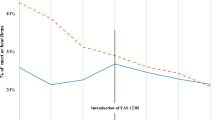Abstract
Managers place a low value on equity-based compensation because it exposes them to the risk of the firm. Such undervaluation and the need to achieve diversification may force a manager to sell his own stock of the firm in response to equity-based awards. In this paper we examine whether such stock selling by an executive depends on the aggregate level of management ownership of the firm. We argue that stock selling occurs at a high level of aggregate ownership where an executive has a low probability of being replaced. Our findings support this “management ownership” argument of compensation-based stock trading. One implication is that the board's effort to minimize agency conflicts becomes less effective once aggregate ownership increases to a certain threshold level. (JEL G30, G32)
Similar content being viewed by others
References
Acharya, V.V., K. John, and R.K. Sundaram. 2000. “On the Optimality of Resetting Executive Stock Options.”Journal of Financial Economics 57: 65–101.
Aggarwal, R.K., and A.A. Samwick. 1999. “The Other Side of the Trade-off: The Impact of Risk on Executive Compensation.”Journal of Political Economy 107: 65–105.
Allen, M.P. 1981. “Managerial Power and Tenure in the Large Corporation.”Social Forces 60: 482–494.
Allen, M.P., and Sharon Panian. 1982. “Power Performance and Succession in the Large Corporation.”Administrative Science Quarterly 27: 538–547.
Black, F., and M. Scholes. 1973. “The Pricing of Options and Corporate Liabilities.”Journal of Political Economy 81: 637–659.
Boeker, W. 1992. “Power and Managerial Dismissal: Scapegoating at the Top.”Administrative Science Quarterly 37: 400–421.
Brenner, M, R.K. Sundaram, and D. Yermack. 2000. “Altering the Terms of Executive Stock Options.”Journal of Financial Economics 57: 103–128.
Carpenter, J.N. 1998. “The Exercise and Valuation of Executive Stock Options.”Journal of Financial Economics 48: 127–158.
Dann, L.Y., and H. DeAngelo. 1988. “Corporate Financial Policy and Corporate Control: A Study of Defensive Adjustments in Asset and Ownership Structure.”Journal of Financial Economics 20: 87–127.
Denis, David J., Diane K. Denis, and Atulya Sarin. 1997. “Ownership Structure and Top Executive Turnover.”Journal of Financial Economics 45: 193–221.
Gilson, S.C. 1989. “Management Turnover and Financial Distress.”Journal of Financial Economics 25: 241–262.
Gilson, S.C., and M.R. Vetsuypens. 1993. “CEO Compensation in Financially Distressed Firms: An Empirical Analysis.”Journal of Finance 48: 425–458.
Hall, B.J., and J.B. Liebman. 2000. “The Taxation of Executive Compensation.”NBER/Tax Policy and the Economy 14: 1–44.
Hall, B.J., and K.J. Murphy. 2000. “Optimal Exercise Prices for Executive Stock Options.”American Economic Review 90: 209–214.
Jensen, M.C., and W.H. Meckling. 1976. “Theory of the Firm: Managerial Behavior, Agency Costs and Ownership Structure.”Journal of Financial Economics 3: 305–360.
Jensen, M.C., and K.J. Murphy. 1990. “CEO Incentives—It's Not How Much You Pay, but How.”Harvard Business Review 68: 138–153.
Jensen, M.C., and R.S. Ruback. 1985. “The Market for Corporate Control: The Scientific Evidence.”Journal of Financial Economics 11: 5–50.
Kennedy, V.A., and R.J. Limmack. 1996. “Takeover Activity, CEO Turnover, and the Market for Corporate Control.”Journal of Business Finance and Accounting 23: 267–285.
Jin, L. 2002. “CEO Compensation, Diversification, and Incentives.”Journal of Financial Economics 66: 29–63.
Martin, K.J., and J.J. McConnell. 1991. “Corporate Performance, Corporate Takeovers, and Management Turnover.”Journal of Finance 46: 671–687.
McConnell, J.J., and H. Servaes. 1990. “Additional Evidence on Equity Ownership and Corporate Value.”Journal of Financial Economics 27: 595–612.
McEachern, W. 1975.Managerial Control and Performance. Lexington, MA: Heath.
Mehran, H. 1995. “Executive Compensation Structure, Ownership, and Firm Performance.”Journal of Financial Economics 38: 163–184.
Meulbroek, L.K. 2001. “The Efficiency of Equity-Linked Compensation: Understanding the Full Cost of Awarding Executive Stock Options.”Financial Management 30: 5–44.
Mikkelson, W.H., and M.M. Partch. 1989. “Managers' Voting Rights and Corporate Control.”Journal of Financial Economics 25: 263–290.
Ofek, E., and D. Yermack. 2000. “Taking Stock: Equity-Based Compensation and the Evolution of Managerial Ownership.”Journal of Finance 55: 1367–1384.
Song, M.H., and R.A. Walkling. 1993. “The Impact of Managerial Ownership on Acquisition Attempts and Target Shareholder Wealth.”Journal of Financial and Quantitative Analysis 28: 439–457.
Walsh, J.P. 1989. “Top Management Turnover Following Mergers and Acquisitions.”Strategic Management Journal 10: 173–183.
Walsh, J.P., and J.W. Ellwood. 1991. “Mergers, Acquisitions, and the Pruning of Managerial Deadwood.”Strategic Management Journal 12: 201–217.
Author information
Authors and Affiliations
Corresponding author
Additional information
This research was carried out with the support of the Western New England College research fund.
Rights and permissions
About this article
Cite this article
Iqbal, Z., Shetty, S. Compensation-based stock trading by corporate executive and aggregate management ownership of the firm: Some additional evidence. J Econ Finan 28, 270–284 (2004). https://doi.org/10.1007/BF02761617
Issue Date:
DOI: https://doi.org/10.1007/BF02761617




